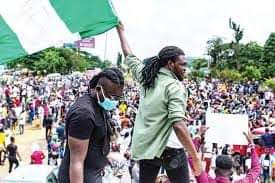By: Abdulrasaq Kamaldeen

The primary tool that oppressed citizens use against their oppressors is protest. And to me, I believe it enables the weary-hearted to voice their pain and seek an end to their suffering. As a constitutionally protected right, protest allows citizens to publicly express their concerns to those in authority.
Martin Luther King Jr. once said, “Protest is the language of the unheard.” Fine! The Constitution guarantees us this right to publicly proclaim our suffering and hardship through peaceful means and claim what belongs to us.
The idea of protest is to outcry for an easy country, and directly demonstrate to the government to reform their ways of governance, this can be done through rallies, marches, campaigns, etc.
It is a medium to draw leaders’ attention to particular national issues or causes and spark conversations–pressure governments or institutions to change policies or laws, leading to tangible reforms.
The protest has been a tool for the reformation of the country’s hardship. Therefore, it’s also a tool of destruction because protest sometimes leads to violence even though the protesters aim for peaceful ones.
In the course of the Protest, the protesters who have campaigned for tangible reformation may employ atrocities, and the devilish spirit will aid and abet their movement, riot and commotion will be rooted out. Many unwanted incidents may occur from the movement like the destruction of valuable institutions, societal unrest, killing of innocent people, injuries, etc.
The proposed protest from August 1st to 10th by the Nigerians to curb hardship and grievances is an exercise of constitutional rights in the Nigerian Constitution. But let this pond in our heart that the constitution which gives us this right also puts limitations on the exercise, because it’s not absolute, it prohibits the destruction of public properties–no matter how the hardship we are experiencing lets the star rise, protest with violence will not give birth to anything but destruction and regret.
Our dear government is awaiting the protesters’ action and motive. In the long run, try to ensure peace so that what happened in the past will not happen again like the EndSARS protest. This is how EndSARS begins until it changes to the exchange of gunshots from citizens to government agencies.
Among the protesters, a few of them are miscreant and to run out of the country after the triggered pandemonium in the country, remember that Nigeria is your country no other country will welcome you as theirs–no matter how long you stay you will still return home. Our dear nation is our dear home, let the proposed protest should be by the law.
As the motto of the protest implies #Endbadgovernance, the core of the protest has to be maintained so that it will not change to #STOPKILLINGPEOPLE. Because the disaster that occurred in the EndSARS protest on 20th, October 2020 might happen again. A day when innocent people answered God’s call, a day when the national flag was stained with innocent blood, and a day Nigerians will never forget. The writer is not in support of the protest, but as you are preparing for the protest let it be in a reasonable manner.
When the #EndSARS protests erupted, the protesters demolished the best and most well-equipped police forensic laboratory in Africa, built by the Lagos State Government. They also destroyed and burnt public infrastructure worth billions, including hospitals, bus stations, and businesses that employ thousands of Lagosians. The outcome of EndSARS makes our economy stagger like a toddler aiming for a walk.
The EndSARS protest had a devastating impact on the fragile Nigerian economy. With an oil
economy trying to pick up from the ruins of the COVID-19 pandemic, a recession was already
looming and unavoidable. The Lagos Chamber of Commerce and Industry (LCCI, 2020) disclosed that Nigeria lost more than N700 billion in economic value since the EndSARS protests started.
Fagbo, (2020) asserts that, while the protest went on, the short-term economic consequences for the people began to mount. A drop in consumer spending on non-essential goods was one of the most visible signs of its impact. The protest shut down major activities of Nigeria’s busiest airport with major roads blocked and economic activities brought to a halt.
I hope we can all recall that on the 17th of October, 2020, the EndSars protest took a different turn as thugs began to attack peaceful protesters in cities and towns across Nigeria. In the country’s capital, Abuja for instance, on the 17th of October, 2020, thugs launched an attack on protesters at Kubwa in the outskirts of the city.
Two days earlier in Lagos, thugs had attacked protesters at the Lagos Government House, Alausa. On the 20th of October, 2020, things snowballed into something larger, the looting and destruction of public buildings and private businesses, inspired by the looting of Covid-19 palliatives kept in some warehouses across the Nation brought the Nation to a standstill with police stations and other Paramilitary security vehicles destroyed across the Nation (Nkasi, 2020).
Let us have a walk to Kenya which is still facing hardship due to the protest; four people were shot dead during the protests on July 16, allegedly by police. The number of casualties has been on the rise since demonstrations first started, with more than 50 people killed since June, according to the Kenya National Commission on Human Rights.
Protest is not only the best language to speak to the government and not the best means to stand against the government, mostly, the end of it is remorseful.
